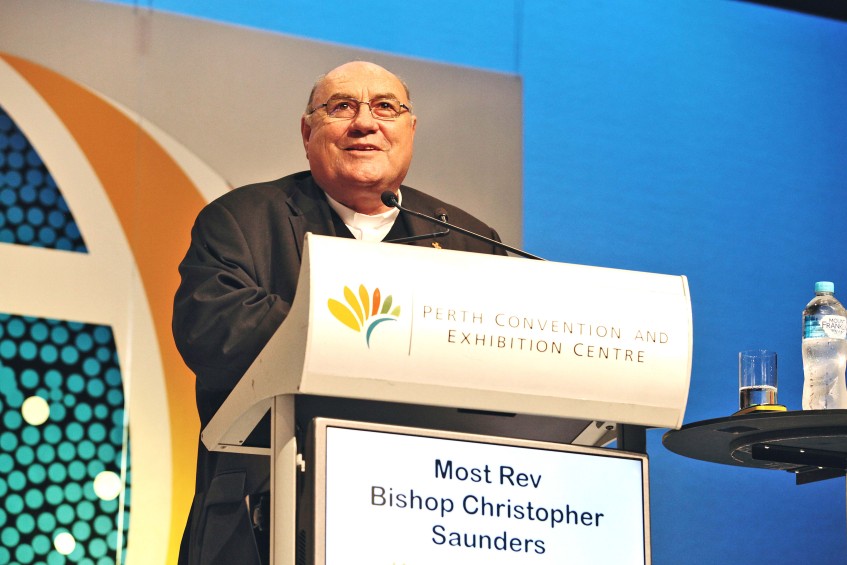2016 NCEC Conference: Bishop Saunders urges educators to spread the Good News

Bishop of Broome, Christopher Saunders, delivers his Keynote Address, titled ‘Pathways for Christian Discipleship’, at the 2016 National Catholic Education Commission Conference. Photo: Supplied
By Rachel Curry
Our calling to Christ and our mission to spread His message are one and the same, Bishop of Broome, Christopher Saunders, said in his speech to 1,400 Catholic educators last month.
Bishop Saunders was speaking on the topic of ‘Pathways for Christian Discipleship’ on Sunday, 19 June, as part of the 2016 National Catholic Education Commission Conference in Perth.
After praising the religious and lay missionaries who had done remarkable work in the Kimberley since 1884, the prelate said it was unfortunate how often Christians today separated their calling from their mission.
“It has been all too commonplace in this country, I’m afraid,” he said.
“So many of our people have been content to receive inwardly what God offers them but not to give out to others in the way of mission.
“In 1975, in that wonderful document Evangelii Nuntiandi, Pope Paul VI says, ‘It is unthinkable that a person should accept the Word without becoming a person who bears witness to it’.”
This viewpoint has its origins in the Gospels, he said, where there is a “radical connection” between calling and mission.
“Jesus calls His disciples to follow Him and then He sends them out on their first teaching pracs,” he said.
“They have received much from Jesus and then they are called to give in return to those to whom they are sent.”
Bishop Saunders went on to tell the story of two parishioners in his diocese, who had each overcome a difficult past to forge a new relationship with God, and were now spreading the Good News throughout their communities in the Kimberley.

About 1,400 representatives from the Catholic education sector attended the conference, which was held from 19-22 June at the Perth Convention and Exhibition Centre. Photo: Supplied
He said it was important to acknowledge that, just as we are called according to the particular circumstances of our lives, our response in mission will also lie within these parameters.
“The mission that emanates from our calling, in which we become Christ to others, may be within the limitations of our neighbourhood, or our place of work, or in the bounds of our community, or simply within the family into which we are born,” he said.
Most importantly, we should carry out our mission with humility, Bishop Saunders said.
This example was first set by Mary, who, in some ways, became the first missionary when she visited her cousin, Elizabeth, with Christ in her womb.
“She brought Him as Good News to someone else which is, of course, precisely what we do as disciples ourselves,” he said.
“We hear the Word and we share the Good News, and by what we say and do, we present Christ to others.
“It is obvious, is it not, that we are most effective, most authentic, when we are humble, when the power of discipleship we exercise is born not out of pride but of humility.”
In contrast, it was when the Church had acted most arrogantly that its credibility was most damaged, Bishop Saunders said, as was the case with the issue of child sexual abuse.
“A lack of humility, or anything resembling it, such as clericalism, is an obstacle that closes the pathways to discipleship and renders our service of the Lord and our fellow human beings, and His Church, as insipid, tasteless – like the salt that is thrown out and trampled underfoot,” he said.
Bishop Saunders said Pope Francis was providing a tremendous example of the “faith-inspired commitment to humility and service” to which God calls us.
He said all leaders in the Church in the 21st century must ask themselves if they, too, were committed to this mission.
“Educators, like ministers in faith communities, have to, in this age of acute accountability, strive faithfully to close the credibility gap between who we say we are and how others perceive us,” he said.
“It is up to us in the quest for authenticity to eradicate all those obstacles that separate us from fulfilling our mission of serving our God and neighbour.”
